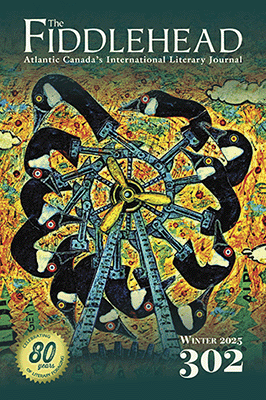
Our winter issue carries both reasons to celebrate and reasons for sadness. It’s in sadness that I share with you the passing of Dr. Robert “Bob” Gibbs, a writer and scholar who among his various contributions to literary life, was editor (1971–73) and poetry editor (1967–95) of The Fiddlehead. Dr. Roger Ploude, Bob’s colleague at the University of New Brunswick and another of our past editors, remembers Bob as “unfailingly kind to me and all others whose lives he touched. Himself a talented writer, he was instrumental in establishing the [English] Department’s strong programme in creative writing and will be remembered by so many for the time and encouragement he dedicated to young writers.” This is true: I met Bob a couple of times when I was a creative writing student, and his quiet kindness was hearth-like to me then. Robert Cockburn, another “Bob” who has also served as poetry editor for The Fiddlehead, writes, “I remember Bob with fondness and admiration. When I joined the Department in 1968, his astute counsel guided me through teaching Canadian literature to the large classes of that time. Our shared passion for writing poems further increased our friendship, which I valued throughout our years together in Carleton Hall.” Please look to our Spring issue for a more fulsome celebration of Bob’s life and work as we continue to carry his legacy forward.
The current issue celebrates the winning story from our short fiction contest, “Roses for Bodies” by Luanne Gauvreau — the story is lauded by judge Zilla Jones on the next page (thanks, Zilla!). I would also like to congratulate everyone who entered a story; both writing and sending out creative work takes effort and courage. And though a prize is a moment to shine a particular spotlight on one piece of work, our pages are also filled with celebration-worthy fiction, poetry, creative nonfiction and reviews. In particular I’d like to thank D.A. Lockhart — wanishi — for his review of Emily Riddle’s poetry collection, The Big Melt. This review replaces a problematic review we published online; I’m grateful for the way that he contextualizes the poetry in the complexities of Indigenous-settler relations, considers the different identity positions from which the work may be read, examines the aesthetics in play, and unpacks the effects of Riddle’s use of untranslated Cree words. I’ve learned a lot from reading it, and I hope others can too.
Sue Sinclair
Fredericton, Wolastoqiyik Territory










